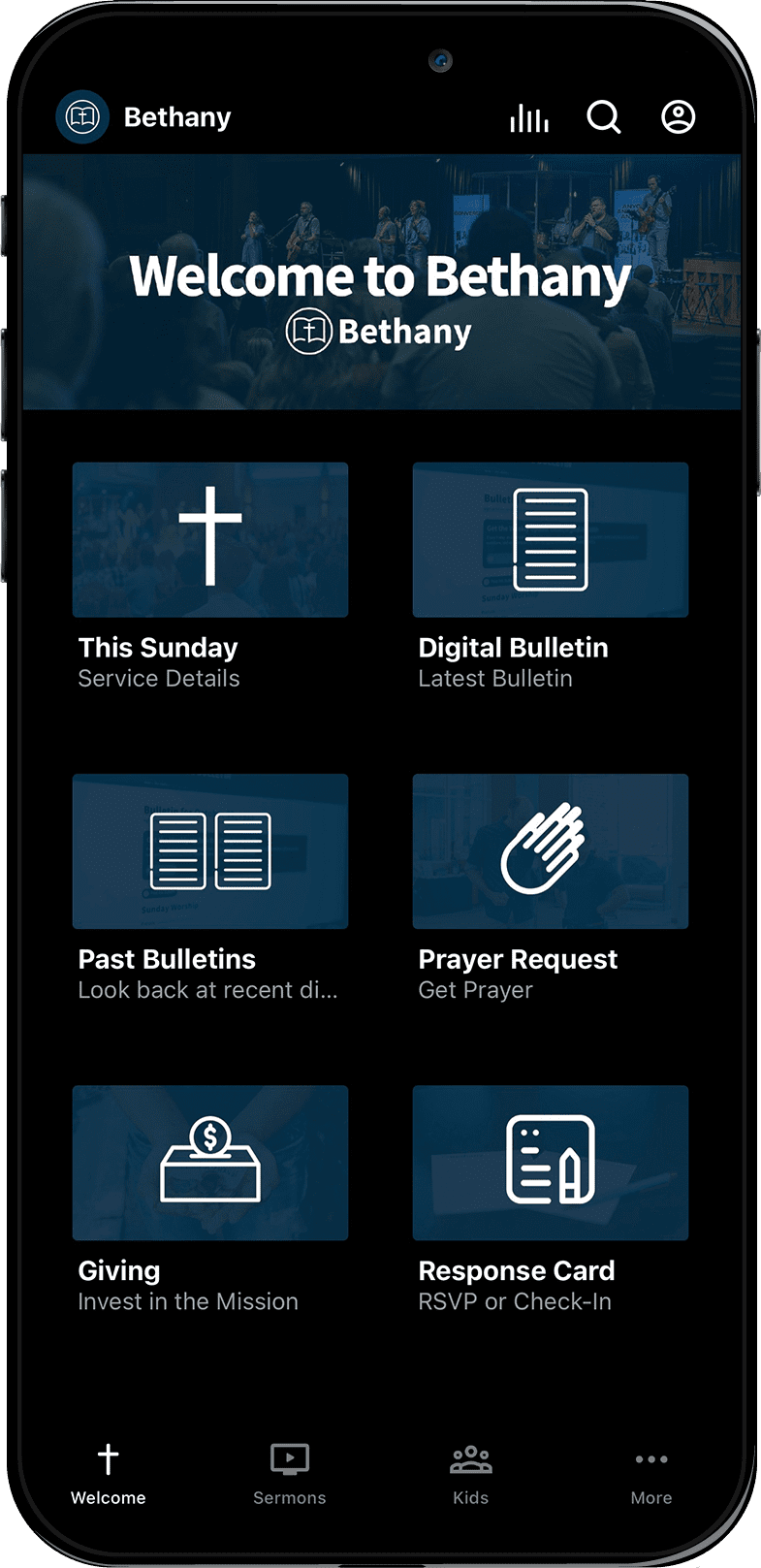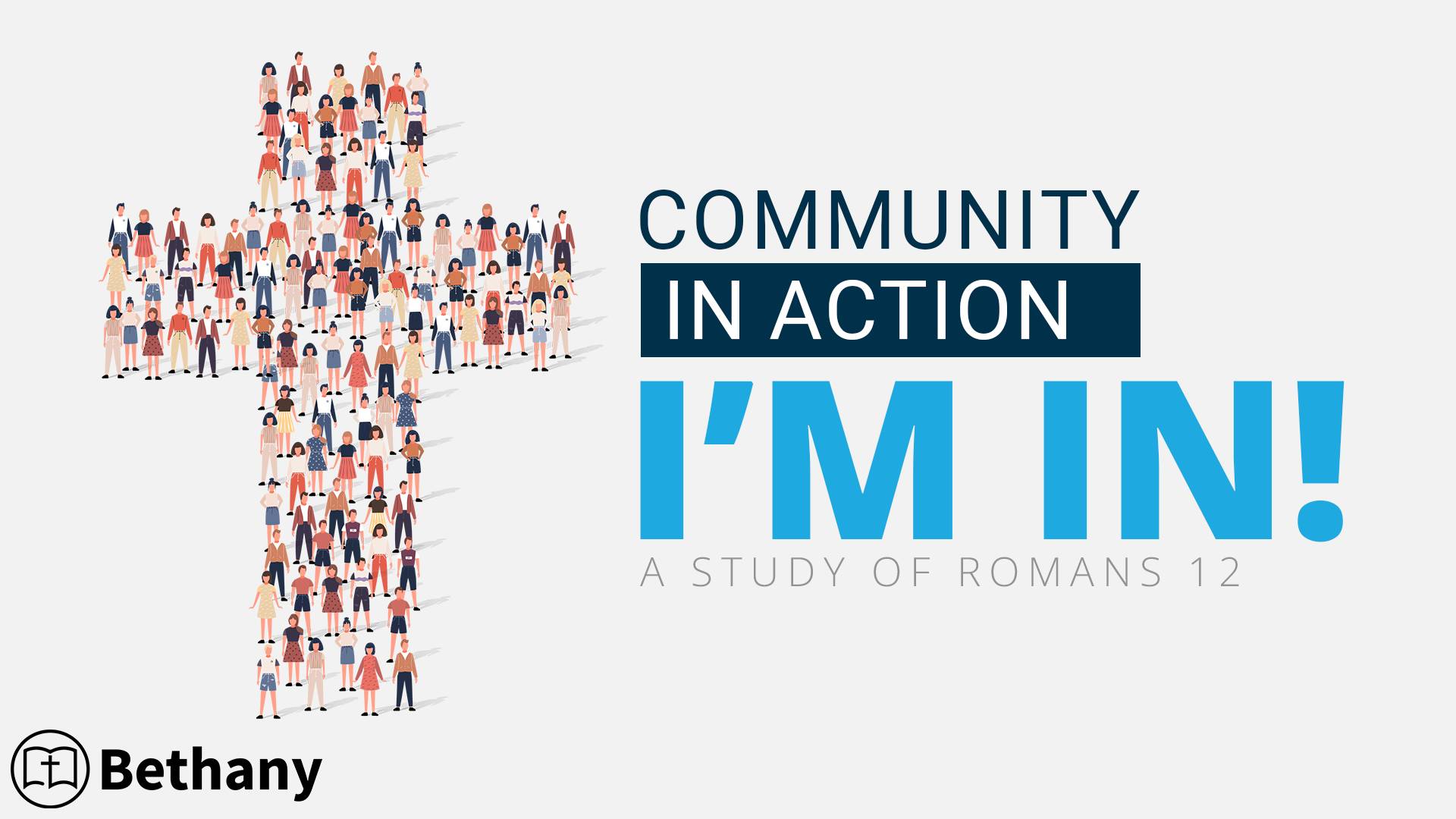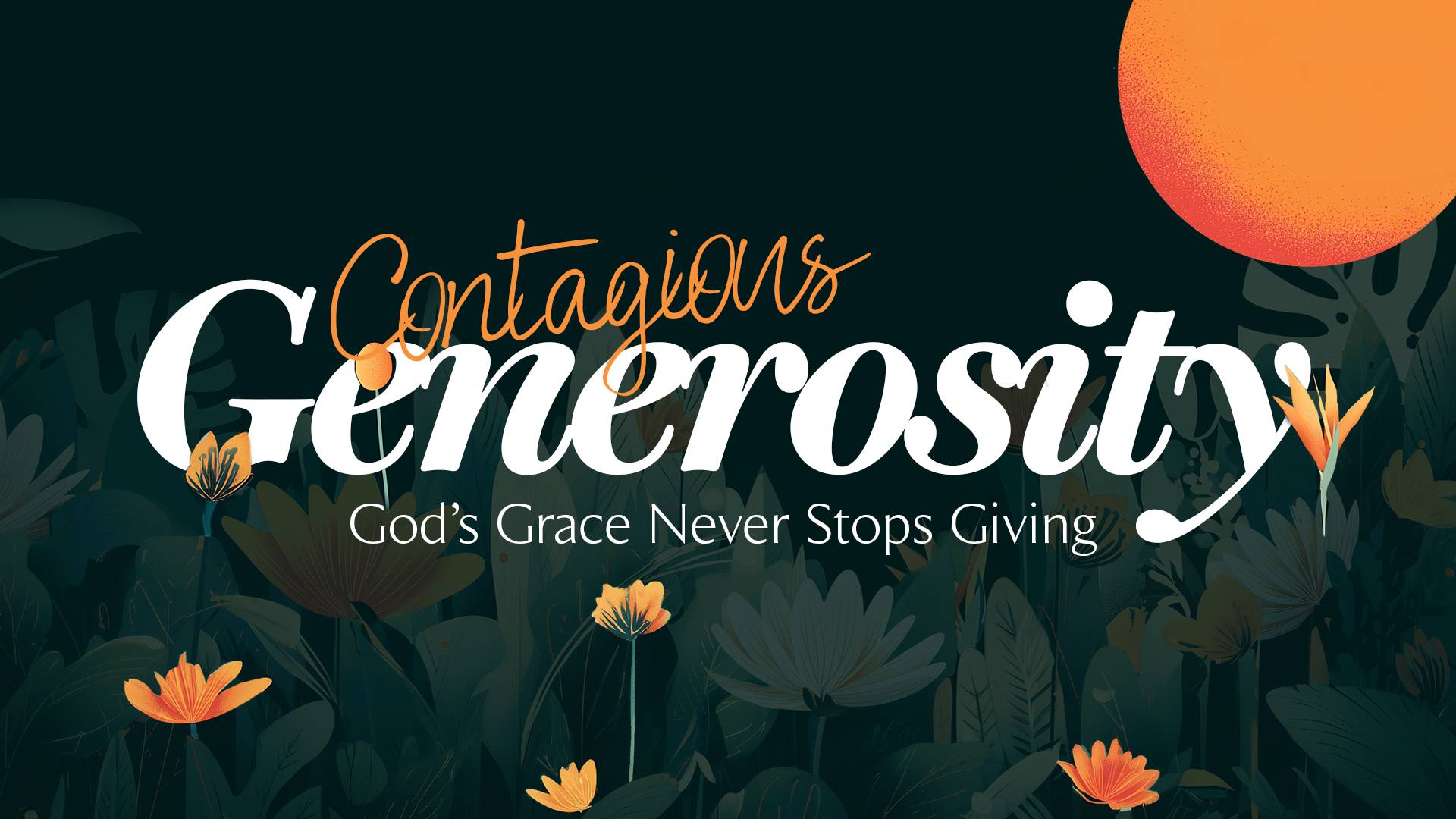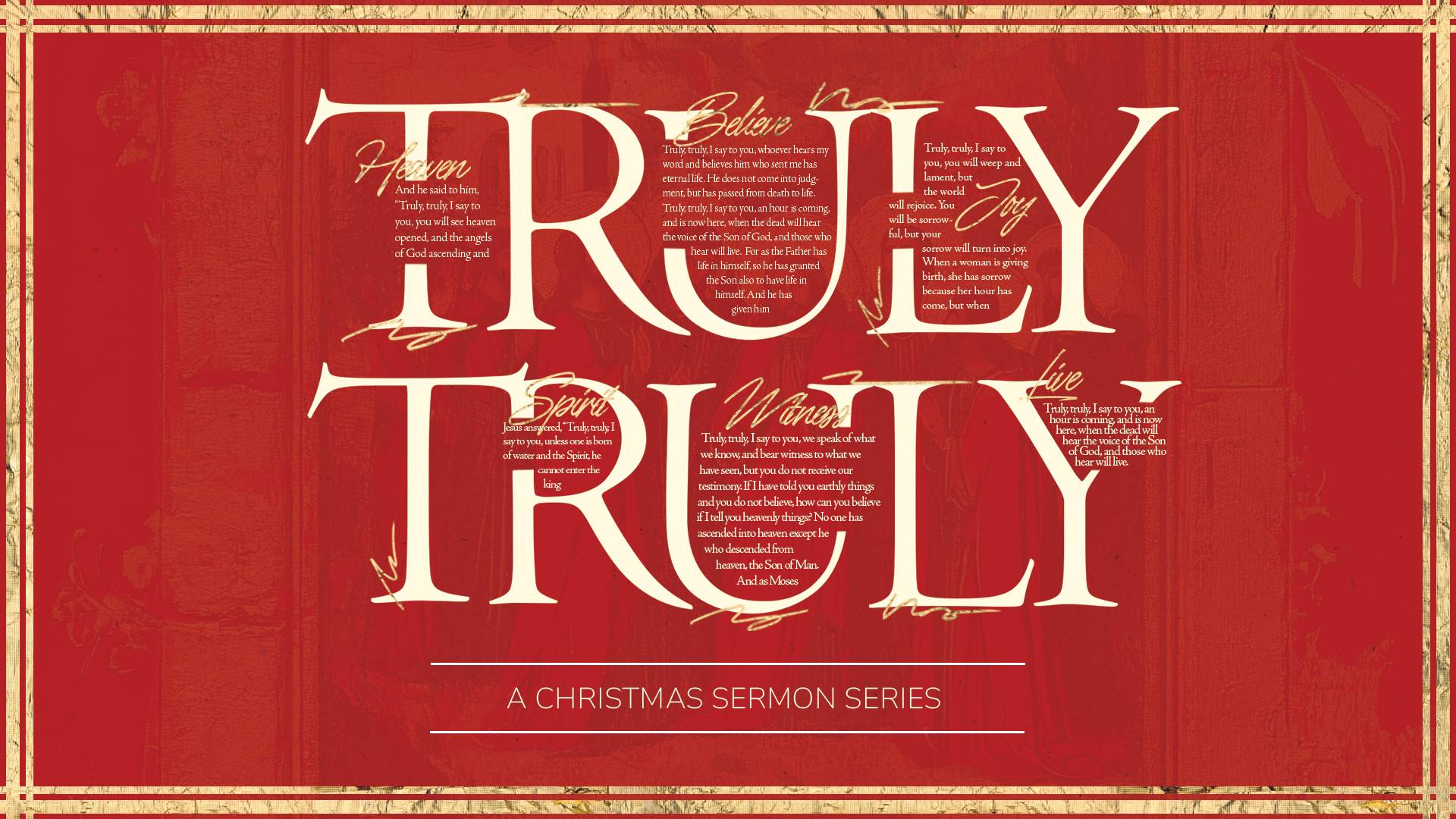In This Series
The Foundation of Christian Community
Romans 12:1-2 (ESV)
July 31, 2022
Dr. Ritch Boerckel
We’re beginning a new series, today. On the front of your bulletin you’ll see the graphic for that series. The graphic says Community in Action: I’m In! It’s a series in Romans 12 about God’s design for His church, for us to live for Him, to serve Him, and to be like a city set on a hill to be light in this dark world. So for the next several weeks, we’re going to be talking from Romans 12 about community in action. There is a cross made up of people. That’s the body of Christ. So, pray over this series. Pray specifically for its impact upon your life, upon your family. During this time, we’re going to be launching anew the Community Group ministry. We believe for our church, it’s the most fruitful means by which you can experience church. So we’re going to try to have 110% of us involved in Community Groups. The 10% comes because there are going to be 10% more folks here by the end of this year. That’s how I believe, anyway. I believe the Lord would allow us to have more people who come to faith in Christ and to see baptisms and the joy of discipleship. So pray over that, about your participation particularly in your own local church as we walk through Romans 12.
I’m going to invite you to turn to Romans 12 with me. We’re going to read just two verses. These are some of the two most famous verses in all the New Testament. They’re famous for good reason. They really attend to almost everything pertaining to our life in Christ and God’s call for us to devote ourselves to Him on the basis of His love for us. Let’s listen to what the Spirit would say to His church through the Spirit’s Book. This is the Spirit’s Book.
1 I appeal to you therefore, brothers, by the mercies of God, to present your bodies as a living sacrifice, holy and acceptable to God, which is your spiritual worship. 2 Do not be conformed to this world, but be transformed by the renewal of your mind, that by testing you may discern what is the will of God, what is good and acceptable and perfect.
A few weeks ago, Kimberly and I were visiting another couple on the porch of a cabin. We were talking together, when a six year old boy opened up our screened porch door and stepped inside. Now, this six year old boy had this wonderful smile on his face. I kind of knew him. He’s from a family in our church. I didn’t know him that well, so it surprised me that he would enter into our porch. He stood there for a while. We stopped talking and said, “Why, hello!” He said, “Hi!” I said, “How are you?” He said, “Great!” Finally we asked him, “It seems like there is something you’d like to share. Is there something you’d like to share?” He began nodding very happily and excitedly. He said, “I’m a child of God!” Isn’t that fantastic? We told him, “This is fantastic! That’s the best message we’ve heard, ever! That’s awesome! You’re a child of God. Tell us about it.”
He told us how the week before he went to VBS right here at Bethany. We talked together about Bible Bill. We talked about his teacher, Rick. We talked about the message that he heard, about how Jesus Christ had come to die on a cross, to rescue us from our sins and that anyone who received Him would have the right to be called a child of God. That was really important for him. “I’m a child of God!” We kind of reviewed how a person becomes a child of God.
At VBS, they talked about the ABC’s. “A” means you acknowledge that you’ve sinned against God and you’re in need of a Savior. “B” means you believe that Jesus is God come in the flesh and that He died on the cross for you and that His death provided a forgiveness that would bring you into relationship with God Himself. Then “C” means that you would confess Jesus as Lord. It’s that the faith that is inside your heart would be a faith expressed both upward to God and outward to others. He wanted to tell us, “I’m a child of God!”
Well, what this little boy discovered for himself through faith in Jesus is the most important matter of life. I want to ask you before we enter into Romans 12:1-2, are you a child of God? That question is the most important question any person could ever possibly answer. As we open up our Bibles to Romans 12 this morning, we’re beginning a new series entitled Community in Action: I’m In! It’s designed to encourage people who are children of God to relate to their brothers and sisters in their own spiritual local family in a way that would bring honor to God. Everything we say, though, is built upon the foundation of being a child of God. So we have to ask the question before we dig in. Are you a child of God? Because if you’re not, what we’re going to say later is not going to have any meaning to you.
Think about this! If you are a child of God, you are able to call the God who spoke the worlds into creation, you are able to call Him, Father. If you are a child of God, then you have God the Son promising to build you a room in the Father’s house, designed for you, where you’re able to be with the Father forever and ever. Isn’t that amazing? If you are a child of God, then you have an inheritance with Jesus Christ. All that Jesus inherits He shares with brothers and sisters. If you are a child of God, you have a real relationship with God Himself so that when you call out to Him in every need at every moment, He is a God who actually hears everything you say to Him and He personally cares for you. He cares now and He cares forever. If you are a child of God, you have God walking with you every day. He is a God who will protect you, a God who will provide for you, a God who will guide you all the way through every step in this broken, despairing, difficult world.
So I want to begin by asking you, are you a child of God? If you answer that by saying, “I’m not sure if I’m a child of God,” I want you to hear the Good News that God sent His Son, Jesus, to die on the cross and to be resurrected so that you can be brought in and adopted into His family. Call out upon Him right now. He is inviting you to come. Everyone who comes to Christ has the authority and has the right to be called one of God’s children.
So as a people who have come to Jesus Christ and are adopted by God and now have God as our Father, people who are children of God through faith in Jesus, it is my prayer that through this series in Romans 12, we as a spiritual family, as a church family, will experience a strengthening from God resulting in a love for God that is expressed through worship, but also in a love for one another. It’s expressed through genuine care and commitment in relationship. Then it’s expressed through our linking arms to fulfill the ministry of Jesus. Jesus has ascended into heaven. He is at the right hand of the Father, but He has given us ministry. It’s His ministry. It’s not any one of our ministries. It’s His ministry to do the will of God and do the work of God and bring the grace of God into this world through us, His people. It’s remarkable!
This series seeks to answer the question: Now that I’m a child of God through faith in Jesus, how should I relate to my brothers and sisters in my own local church? Our focus this morning falls on these first two verses of Romans 12. Let’s read them once again together.
1 I appeal to you therefore, brothers, by the mercies of God, to present your bodies as a living sacrifice,
What a picturesque way of thinking about devotion to God. We think about it as a living sacrifice.
holy and acceptable to God, which is your spiritual worship. 2 Do not be conformed to this world, but be transformed by the renewal of your mind, that by testing you may discern what is the will of God, what is good and acceptable and perfect.
These verses are most loved for good reason. There are so many applications that flow from these two verses. It’s right to make dozens and dozens and dozens of different kinds of applications built upon them. So for instance, we may present our bodies to God by being sexually pure in an impure age. We may present our bodies to God by living honest lives in a dishonest world. We may present our bodies to God by husbands loving their own wives and by wives loving their own husbands. We may present our bodies to God by being witnesses in this world, by courageously taking the risk of telling other people about Jesus, knowing that they might reject us because of it. We may present our bodies to God by walking with God through reading the Word each day, by praying to God every day, and having a real relationship time with Him. We may present our bodies to God by giving of our resources; our time, our talent, our treasures, to advance the name of Jesus in this world.
The list of appropriate applications of Romans 12:1-2 goes on and on and on and on. But I want to ask the question, what specific application does Paul make to this foundational commitment that children of God make to the Lord? What’s the application? What do we do as a result of presenting our bodies as a living sacrifice? What I believe we’ll see through Romans 12 is that the chief application that Paul drives home is that we love each other. We love the whole of our own local church. We commit our lives to ministering and serving with other brothers and sisters to fulfill the ministry of Jesus and we encourage one another all the way until the end of our lives. That is the driving application of what it means to be wholly committed to God. It means that we’re wholly committed to loving one another in the church. Why do I say that? Let’s look at a few verses that flow from Romans 12:1-2.
Romans 12:4 For as in one body we have many members,
This is Paul’s application of Romans 12:1-2.
Romans 12:4-6 …and the members do not all have the same function, so we, though many, are one body in Christ, and individually members of one another. Having gifts that differ according to the grace given to us, let us use them:
So the application that Paul makes right away is using our spiritual gifts together with other brothers and sisters who have spiritual gifts fulfills the ministry of Jesus.
Romans 12:9 Let love be genuine.
In other words, whatever is happening when you gather together as a church family, let love be genuine. Let it be authentic. Let it not be sort of like the superficial façade of, “Hello. I care about you. How are you doing?” But let it really be true. Let it be something that sort of boils in your own soul of expressing your commitment, your affection, your love for one another.
Romans 12:10 Love one another with brotherly affection.
He’s using now a terminology from physical families. In physical families, if you came from a healthy home, you’re going to understand what he is saying about transferring the kind of brotherly love. Do brothers fight? Do brothers disagree? Do brothers ever get in conflict? Do brothers ever say, “I don’t like being in the room with you right now”? Yes. In healthy families, they do. But when they leave the room, they know it’s momentary. They know they’re going to come back into the room because they’re committed throughout life. They know that while my brother might get angry, he’s never going to forsake me. So Paul says to love one another with that kind of love. That’s what causes the church to be an expression of the Gospel. It’s that you love one another with brotherly affection. In fact, he says
Romans 12:10 …Outdo one another in showing honor.
As you gather together, it’s not your own preferences that you’re seeking. I want this person to be honored more than I want me to be honored. Whatever else is happening in the church, let’s just take some songs that we sing. What I really want is the person sitting next to me to sing the kind of songs that really fill their heart with joy and praise. That’s what I want far more than I want to sing the songs that fill me with joy and pleasure. I really, really want to outdo one another in showing honor. It’s that kind of generous relationship that flows out of Romans 12:1-2. Then he says
Romans 12:11 …serve the Lord.
Join hands together. The idea is the togetherness of serving the Lord. It’s not just individually, but serving the Lord together. Together we
Romans 12:12 Rejoice in hope,
We think about the future that we have.
Romans 12:12 …be patient in tribulation.
When you have things that simply go wrong, whether it’s electricity that shuts off or something far more severe, you say we’re going to be with each other. There are some folks that might not respond well. They might get a little bit grumbly. But we’re going to be patient in the midst of tribulation. We’re going to endure the trial, but we’re going to endure and be patient with people’s responses in that. He goes on to say
Romans 12:12 …be constant in prayer.
There is a heart of anticipation that God would have in His church that we’re just praying and praying and praying and praying for one another. We’re always rolling through the concerns that we have of our brothers and sisters all through our hearts, upward to God. “God, deliver. God, provide.” Then he says
Romans 12:13 Contribute to the needs of the saints
Again, all these are flowing from verses 1 and 2. What does it mean to present your bodies? It means we contribute to the needs of the saints. What needs? Sometimes the needs are financial and very physical. Often, they’re emotional. Often, they’re spiritual. But it’s saying, “I’m not looking for someone else to make a contribution. I’m looking for me to contribute to the needs of the saints that God has placed around me in my own family.” Then he goes on to say
Romans 12:13 …and seek to show hospitality.
In other words, open your life in such a radical way. Hospitality has the idea of strangers, people we don’t even know. It’s inviting them into your life so that you get to know them and they get to know you.
We’re going to work through all those verses in great focus over the next few weeks. But I just want you to notice that Paul bends the applications of Romans 12:1-2 toward us participating in God’s family, toward us leaning into community, toward us focused on making our own spiritual family strong. Because we’re here, the family is stronger because we’re making a contribution. That’s the application that he gives to Romans 12:1-2.
The commands of Romans 12:1-2 are not so much about individual sanctification as they are about how a whole people approach God together. When God’s people in the Old Testament bring sacrifice to the temple, they don’t just sort of quietly and silently, on their own, find a time when the temple is not busy. No, they come together to bring their sacrifice, to make a joyful celebration together in community to the Lord. That’s the idea. It’s that together, each of us are bringing our own bodies, but we’re doing it at the same time and the same way together so that together we can see ourselves as a people who are consecrated unto the Lord. I want you to notice that it says
1 I appeal to you therefore, brothers,
Again, there is a family term. It’s the idea of togetherness. He is saying these commands together. It’s not just individual. He says
1 I appeal to you
If you put your Greek glasses on, you’ll see that it’s you plural. He’s saying, “I appeal to y’all.” I appeal to you as a people to present your bodies together. So this is not necessarily something we do sort of in the quietness of our own home and the privacy of a prayer closet, but this is something we do together. I appeal to y’all to present your bodies when you’re together. Present yourselves to the Lord so that then there is a whole community that is offered to God. “We together, each one of us together are offering ourselves for your service, for your name, for your glory.”
The main idea that we’re going to trace through here is that our worship of God leads us to loving God and to loving the community God provides with one another in His church. So our vertical worship of God leads us to some very specific applications of the way we relate to each other in the local church, a local church that God designed. If you’re taking notes, there are three parts to this message. The first is
The Center of Christian Community: God’s majesty!
What holds the center? What’s the focus? What’s the priority? There we’re going to find that the center of Christian community is God’s majesty. Paul writes
1 I appeal to you therefore, brothers,
You might circle the word “therefore.” These little words are really important. Whenever you see a therefore in the Bible, you always look to see what it’s there for. In other words, it’s always referencing something that preceded it. So before Paul makes an appeal to God’s people to present themselves in sacrificial worship to God, Paul provides sort of the basis for our worship. The basis of our worship is God’s great worth. Paul is teaching us that wholehearted devotion to God springs from God’s glorious eternal amazing Person. It is God’s infinite worth and value that provides the ground for us to respond to the Lord.
All through Romans chapters 1-11, the Apostle Paul, under the inspiration of the Holy Spirit, has been talking about God’s great worth, about His value, about His majesty and magnificence and strength. In Romans 1-11, we learn of God’s excellence and His eternal power in creating the worlds out of nothing. We learn of God’s perfect righteousness expressed through His wrath against sin. It’s a terrifying thing! We learn of God’s amazing grace demonstrated in His love of sending His own Son to die upon the cross as an atoning sacrifice for sin. We learn also of God’s Spirit giving new life to all who come to faith in Jesus in adopting people who were slaves of sin into God’s family. So now we who were slaves to sin look up at this holy God who is utterly absolutely infinitely righteous and we say, “Abba, Father.” We draw near to Him. It’s amazing! We learn of God’s freedom in His electing love. We learn of His unyielding commitment to His own glory. We learn of His unfailing faithfulness to His promises to His own people, the children of Abraham. We learn all of this of God’s excellence.
Paul, in saying “therefore,” takes us back to what he has taught in the first eleven chapters to say, keep in mind God’s majesty. In Romans 11:36, he sort of sums it up. When we read the Bible, we read it with chapter and verse divisions. That’s not the way the Apostle Paul wrote the Bible. He didn’t write it with chapter and verse divisions. So you come to Romans 11 and you read verse 36. You stop and you say a prayer before you go to bed. You turn out the light. Then the next night, you pick it up at Romans 12 and you don’t see the connection. I want to read this knowing that this is sort of the free flow of the Apostle Paul’s thought in reference to God. He says after describing the magnificence of God,
Romans 11:36 For from him and through him and to him are all things. To him be glory forever. Amen.
1 I appeal to you therefore, brothers, by the mercies of God, to present your bodies as a living sacrifice,
Do you see the connection between our worship and the magnificence of God? Paul is saying to think about your life. Think about everything good that God has provided for you in Christ. Think about who God is and understand that everything is from Him. He created everything that exists. It’s through Him. He is the sustainer of everything, including your own life. It is to Him. All creation is moving toward the chief end of bringing praise to this God who created the world for His own glory. To God be the glory forever and ever. Amen!
Why would we want to present our bodies, our whole life over to God as a living sacrifice? Why would we want to take the agency of control out of our own hands and place it in God’s? We say “God, I no longer have the agency of control, of decision making. I’m placing it in your hand.” Why would we do that? Paul’s response is that it’s because of the majesty of God, because God is worthy. It might be a very weak sense that needs to be strengthened. But if you are a child of God, you know He is worthy. You know that! Everyone who comes to Jesus Christ in true faith knows that He is worthy of yielding everything, our whole life, over to Him. When we yield everything over to Him, we lose nothing. We gain everything.
Imagine for a moment that this afternoon, someone knocks on your door and when you open the door, they have a big rock in their hand. They say, “I would like to trade my rock for your house.” What would you say? You would say, “No deal,” and you would shut the door. That’s a crazy guy! He goes down through your neighborhood to one door after another after another. He gets the same response. “No way!” At the end of the block is a retired elderly gemologist. He opens the door and the person says, “I’d like to trade my rock for your house.” The gemologist takes that rock and he studies it closely. He realizes that this is a stone that is worth thousands of times more than his house. He says, “Deal!” He hands him the key to the house, walks out to get in his car, and he goes to a place where he can sell the rock. What’s the difference? Everybody else in the neighborhood said, “No! You’re a crazy person. That would be a terrible deal for me.” What’s the difference? One has knowledge that everyone else didn’t have. That’s why when you hear
1 I appeal to you therefore, brothers, by the mercies of God, to present your bodies as a living sacrifice,
Most people say, “No way! I want to keep ownership over my own life. I want to do life my way. What are you talking about? That would be a terrible trade. I’d be a loser.” But if you know who God is, you say, “Deal!” every time. I’m going to mess up my life. God is going to preserve it. He’s going to protect it. He’s going to keep it so it has eternal meaning.
So, we come together as a church to give God glory. It is God’s glory that is the center from which everything else flows that we as a church family do and are. We devote ourselves in community together because He is worthy and He is driving us toward something greater than ourselves. His design is this wonderful community called the church. In order to maintain that heart attitude of presenting our body every day, day after day after day, and to doing that together as a church family, what’s the ground? What’s the foundation of all of that? Again, it’s not a big ought to, like we ought to do that. “Let’s do this because it’s our obligation and it’s just what we ought to do.” No, it’s God’s magnificence. It’s the value of who God is. It’s why the guy sold his house for a rock. He saw the value in it. When he observes the value, it’s just a no-brainer. So what do we do as a community? We want to lean into seeking the knowledge and the value of the Lord together. We want to lean into seeking knowledge of His glory, of His greatness. It’s the key to everything. So the center of Christian community is God’s majesty.
The Commitment of Christian Community: God’s mercies!
God does call us to devote ourselves wholly to Him. What’s the motivation of that? It’s God‘s mercies. He says
1 I appeal to you therefore, brothers, by the mercies of God,
Underline that little phrase. What a word that is! By the mercies of God means it’s not just one mercy. It is many mercies; mercy and mercy and mercy and mercy. These verses remind us again that the gas in the tank of the Christian is the recognition and the reception of God’s mercy day after day. It’s the inspiration behind our devotion. What motivates us to continue to present our bodies to God every day is simply the knowledge of God’s mercies being new every morning. Great is His faithfulness!
Satan loves to deceive us into thinking that other gods are far more generous to us than the true God is. In Him is light and there is no darkness at all. Satan is darkness and he wants to cause us to think that what he offers is so much better and so much greater than what the true God offers us. How can we keep from being deceived? We see what wealth can do. We see what power can do. We see what pleasures offer us. We see all these things. Prestige and pride, all these things, we see what they can do. We see the boost that they give us. So how can we keep from being deceived when we’re living in this temporal world? There is only one way I know and it’s by locking into the mercies of God. We recognize that all these other things are frail and they’re fleeting. They don’t ultimately provide what we’re really longing for, which is something eternally meaningful. We look at the mercies of God and we say, “There it is.” Paul says “I appeal to you not just out of what you ought to do, out of cold obligation.” He says “I appeal to you on the basis of God’s mercies.” Keeping God’s mercies in sight helps us to see through Satan’s lies and to know that God is worthy of our worship. How we need that knowledge!
Note that we do not devote ourselves to God in order to receive God’s mercies. Paul doesn’t say, “Present yourselves to God and you’ll receive God’s mercies.” That’s not the order. He says, “You who have already received God’s mercies, present yourselves.” That’s really important because it changes either from a message of works, which is enslavement, or a message of grace, which is a gift and a glory. A lot of people get that mixed up. Even people who grow up in good churches start relating to God as though it’s a barter system. “I do this for you and you’ll do this for me. If I present my body to you as a living sacrifice, then I’ll get more mercy, right?” God says, “No. My mercy is free. Just come to me and I’ll give you mercy.” It’s on the basis of His mercy then that we say I’m so amazed by God’s mercy! He is worthy. I’m going to give my life to Him in worship in everything because I can trust Him in such a way.
The good news is not a bargain where we trade our goods for God’s good. The Gospel is a free gift where He gives us His mercy freely. Then we devote ourselves not so that He would love us more, but because He has loved us so. The prelude to our worship is always the mercy of God. So what do we do? God calls us to keep His mercy in our sights. If we are to devote ourselves to God, we must immerse ourselves in a conscious pursuit and appreciation of His infinite grace and goodness. The Christian motto is not Nike’s motto. Sometimes we think that. “Just do it. Just read your Bible. Just pray more. Just obey the Ten Commandments. Just do it and then you’ll be great.” That’s not the Christian motto.
I’m going to make two statements. I want to ask you the question, what is the good news? The Gospel is good news, right? So what is good news? Statement number 1 is I’m going to come to your house this week and I’m going to give you something that is really going to bring joy to your life. You’re going to be super excited about it. It’s going to make a big difference for happiness and joy in you and your family’s life. That’s statement number 1. Statement number 2 is I have something that I’d like you to do for me. If you do it well enough, I might give you something back that you might like, too.
What’s good news? Of course, it’s the first statement. The good news is not the call for us to do something for God. The good news is good news because it’s the message that God has done something amazing for us. When we receive that something, it’s so overwhelming and so transforming that we say of course He is worthy! In giving my life to God, I am not losing anything. I’m gaining everything. That’s what the message of good news brings to us. Paul says
1 I appeal to you therefore, brothers, by the mercies of God,
Notice this commitment. It’s based on God’s mercy.
to present your bodies as a living sacrifice, holy and acceptable to God,
Again, underline those words. Present your bodies as a living sacrifice. Paul is using the language of Old Testament temple worship to communicate to us a New Testament act of faith. An Old Testament priest would take the body of an animal, a goat or a lamb, and bring that body to the altar. He would take a sharp knife and cut the animal’s throat. Blood would be spilled. The blood would provide an atonement, a covering for sin. Paul here says we’re not a dying sacrifice. We’re a living sacrifice. That means our blood doesn’t need to be shed. Why? It’s because God the Son shed His own blood on the cross and that sacrifice was complete. There doesn’t need to be any more dying in order for forgiveness to be secured. God Himself has provided for us a sacrifice that is complete. But now here is the deal. Present your bodies as a living sacrifice. Bring yourself not for the atonement of sin. No more blood needs to be spilled. That’s complete. But present you bodies to God as an act of worship. In view of God’s mercy, this is only reasonable.
It’s a spiritual understanding of what God has done.
Yet, it’s bodily. It’s not just sort of in this ethereal realm of our spirit, of our soul. There is a bodily act of worship that God calls us to in this passage. It’s a presentation of yielding the authority over our own body, where we are, what we do, how we go about it. We’re no longer boss over our own body. We’ve been bought with a price. We understand I needed to be bought with a price because I was a slave and all that was in front of me was enslavement. I’m bought out of slavery and now I’m a child of God. Now my body is the Lord’s to do with as He pleases. I can trust Him with that. He is only going to do good with that. There is no such thing as devotion to God that is not applied through our bodies. We must avoid the idea that devotion to God is mostly spiritual, internal, and invisible.
If you are asked, “Are you devoted to God?” Some think, “Yes. I come to a church service. I sing some songs and I feel in my soul that I am so close to God. I must be devoted to God because I feel close to Him.” Devotion to God is not first a feeling. It’s not first a desire or an intention. All those things are part of a full-orbed worship, but it’s not first. Devotion to God is a concrete presentation of ourselves with our bodies to the Lord to use as He sees fit.
I say that because over the course of my life as a pastor, I have often talked with people who have said, for instance, “I have never felt closer to God. I’ve never been more committed to God.” All the while, they are engaging their bodies in open, defiant sin. For instance, a person leaves his family, leaves his wife, engages with another woman and says, “But I’ve never felt closer to God. I’m worshiping God.” I take them back and ask, what does Romans 12:1-2 say? The very ground is what you do with your body. So let’s begin there and then we can talk about our soul. But let’s begin there. What are we doing with our body, our hands, our feet, our tongues, every part of us? What are we doing? That’s why Paul says to present your body to the Lord. It’s sort of the root of our commitment.
My son, Danny, has committed the past twelve years of his life to the Air Force. This is a definite bodily commitment. It’s not a commitment he has had in thought, like, “I think about the Air Force a lot.” It’s not an emotional commitment, like, “I just love the Air Force so I just have an affection every time I talk about it.” It is not even just an affection, like, “I love the people here.” It’s all those things in some ways, but first and foremost, it’s a bodily commitment.
Recently, he and his wife tallied up the number of days that he did not sleep in his own bed, but was sleeping elsewhere. So either Florida, New England, London, Germany, most of it in the United Arab Emirates, Qatar, various places throughout the world. How many days each year, on average, has my body been out of my own bed? It’s about 100 nights every year. That’s what his commitment to the Air Force has called him to over the past eight years. For about 100 nights every year, his body is not where his body wants to be, which is with his wife and his family.
A few years ago, after one deployment, his Commander came and said, “We know we’ve asked you to make more sacrifices than most and to be deployed more often than most. So we’re going to give you a long break before we ask you for the next deployment.” Three weeks later, the same Commander comes to him and says, “There is a need that has opened up. What do you think about going on a deployment next week?” Danny said, “Well sir, if this is a voluntary matter where I have a choice or option, I’m going to say a hard no. If it’s an order, I’ve sworn an oath to do my duty and I’ll go with a good attitude.” The Commander looked at him and said, “This isn’t a voluntary deal.” And off he went.
Now I say that because here we have God saying what the Air Force says, only it’s really, really different. God says, “Present your bodies to me. So if I say ‘go,’ you go. If I say ‘stay,’ you stay. But it’s always a voluntary deal.” God doesn’t make us do anything. He says, “I want to prove to you and if you do what I call you to do with your body, you ultimately will prove that my will is good and it is pleasing. It’s the most pleasing way to live and it is perfect. That’s what I want to show you. Trust me, trust me, trust me.” The center of Christian community is God’s majesty. The commitment of Christian community is God’s mercies. The last idea that we want to draw out is
The Conformity of Christian Community: God’s mind!
So how do we get together? How do we have unity? How do we conform to the design of God as His church? How do we do that? Well, it’s by having God’s mind, God’s way of thinking about Himself and about His people. So He starts off by saying
2 Do not be conformed to this world,
In other words, don’t let your mind start thinking with the world’s mindset. The world describes culture and philosophy and affections and values and behaviors and relationships. This culture called “the world” runs contrary to God. It runs in the opposite direction of God and opposite to His glory. This world is filled with self. There is self-direction, self-will, self-centeredness, self-confidence. Both in external behaviors as well as internal attitudes and affections, this world is in conflict with God. So, God says, “As you’re my children now, think like a child of God. I give you the mind of Christ. Use that mind to think about your life and to think about the world you live in and to think about the community in which I have placed you. Use that mind to think the same thoughts Jesus has about your church family and about the world you live in and about your life. Do not let the world squeeze you into a mindset away from me.” The world exerts strong pressure in so many ways. But he says
but be transformed by the renewal of your mind,
By God’s Spirit, we can have the mind of Christ and we can think with a different mind than we thought prior to coming to Christ. This mindset changes everything about our attitudes, our affections, our habits, our commitments.
As I was thinking about this application of Christian community and nonconformity to the world, there is a way that the world thinks about community and there is a way that God teaches about His new community. Those two ways of thinking are absolutely in direct competition and conflict. So let’s think about that. What does it mean to have the world’s mind in relationship to community? What does it mean to have God’s mind? By the way, it is possible to be a child of God and live your life in conformity to the world’s way of thinking. It’s possible. If it weren’t possible, God wouldn’t tell His own children not to be conformed to the world. That’s a real danger for every one of us. So the call is for each one of us to conform our mind to His way of thinking. So what’s the difference?
The world’s mind in relationship to community is that relationships are disposable. God’s mind in reference to community is that relationships are eternal. That’s number one. So what do I mean by disposable? I’m thankful for this little bottle of water. It’s super useful, especially when I don’t have a microphone and when it’s a little hot. What do I do when all the water is gone? You might recycle it, but I’ll never see this bottle again. Someone else might, but I won’t. I take it, and I crush it and I put it in the recycling bin and dispose of it. That no longer has any use for me. At one time, it did. At one time, it was kind of precious and valuable. “I need this! It’s great! Thanks for this bottle of water.” But now, I don’t need it. That’s the way the world views relationships and community. If you have value to me, you’re going to be precious and I’m going to tell you how precious you are. As long as there is some water that I’m receiving, some benefit, I’m going to hold you tight. The moment you’re empty, I’ll toss you aside and then I’ll find another one. “Look at this amazing thing! I’ve got a new water bottle. Now this is so awesome and I get to hold this. I get to drink from this. This is great! That other bottle is nothing anymore. This is fantastic!”
How do we think about community? Is it disposable or is it eternal? Is it something I’m going to hold onto for the rest of my life? The other person might dispose of me, but here is my commitment as a worshiper of God. I’m not going to ever dispose of anybody. By God’s grace, every person that He brings into relationship, I’m going to hold onto as precious.
Secondly, the world thinks resentment is reasonable. God’s mind is that forgiveness is right. The world says in community if someone wrongs you, you’re right to resent them. In fact, you can’t let them get away with it. If you let them get away with that, they’re just going to learn how to do it over again. So sink into resentment. Sink into some bitterness. Take some action. Stand up for yourself. God says forgive just as you have been forgiven. Bear with one another in love. It’s a totally different mindset, isn’t it?
The world says to expect much from others. You get into community and you say, “Here is what other people should be doing if they’re a good community.” God’s mind says to expect much from yourself in relationship to worship.
The world says to be your best self. In other words, think of community as something that enhances your own person, that builds your best self up. God’s mindset is to build God’s new community for His glory. Care about the whole. Then to be a part of that is actually the best way to live and have your own life built up. It’s focused on God. The world’s mind says to value the short-term. God says to value the eternal, that which will last.
2 Do not be conformed to this world,
So here are the applications. Ask God to give you a deeper love for His church. That’s what this series is going to be about. Ask God to specifically give you a deeper love for the church to which you belong. Seek to possess the same thoughts about the church that Jesus possesses. That’s the call of this. I want to have the mind of Christ. I want to think about community the way Jesus does and I want to align my thoughts to Him. That’s hard! In fact, it’s impossible because my own natural way of thinking is quite different.
So I want to end by first asking you, are you a child of God? Do you know that? God says, “I sent my Son to die upon the cross for you. Everything needed for you to be adopted into my family has already been done for you. Just simply open up your heart to Jesus Christ. Receive Him as your own. He is my eternal Son. Anyone who receives my eternal Son is adopted into my family.”
If you have been adopted into God’s family, say, “I am a child of God.” (I am a child of God!) Let us live as brothers and sisters who are living now for a time in a broken world that will only be for a moment. Let us live as brothers and sisters, as people who will share adjacent rooms forever and ever in the Father’s house.
Latest Sermon Series
Get the App
Watch the Latest Sermon
Get access to each week's sermon right on your phone. Look up sermons & series.Get the Digital Bulletin
Get the latest updates, events, & family news by checking out the digital bulletin.

- 1Watch the Latest Sermons
- 2Get the Digital Bulletin
- 3Tell us how to pray for you
- 4Get updates and notifications









